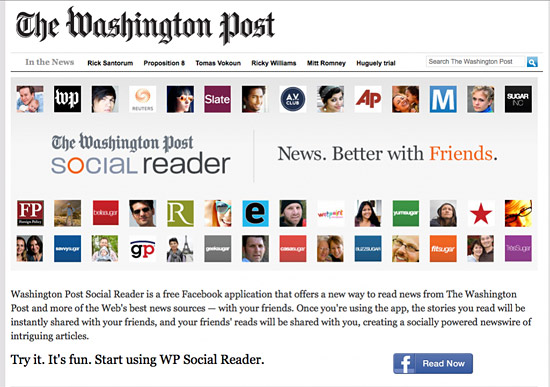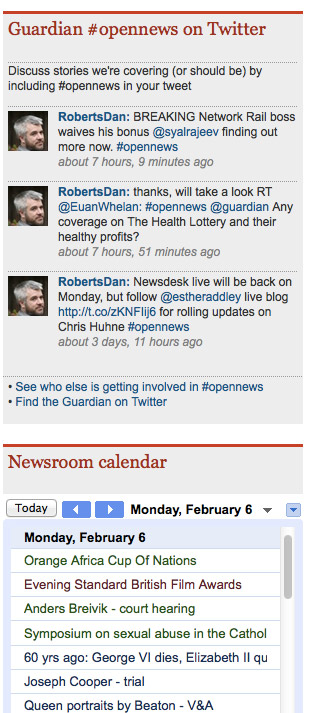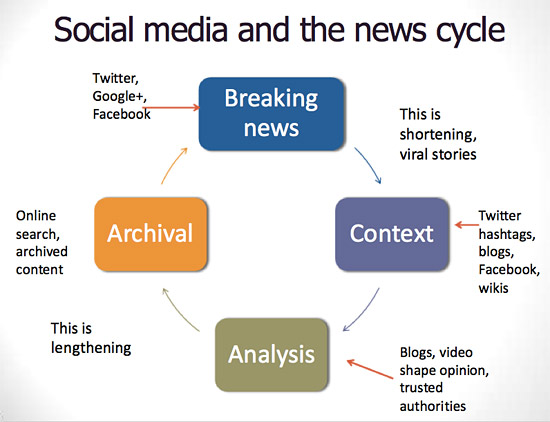News becoming more social as publications turn to apps & hubs
Target audience: Journalists, online news staffs, Web publishers, news consumers, nonprofits, foundations, businesses, educators.
Earlier this month I gave a presentation for the New England Press and Newspaper Association‘s winter conference on how social media is impacting journalism and the newspaper industry. I appeared on a panel with Boston Globe reporter Milton Valencia and “Crowdsourcing”d author Jeff Howe. Milton spoke enthusiastically about why Twitter matters to journalists, and Jeff explained the virtuous cycle of reporting and online community that makes reporting better. During the presentation, I identified four areas impacted by social media: the changing definition of an authoritative news source, the concept of news participators, how news is shared, and the changing news cycle.
Authority = trust
In the age of social, a newspaper and its journalists must earn authority; who is an authority is now decided by news consumers. For decades, even centuries, there’s been a “paper of record” that has been considered the authority on what is news. No longer. According to the Pew report Understanding the Participatory News Consumer, 30 percent of Internet users get news from a combination of friends, journalists, or news organizations that they follow on social networking sites. Moreover, half of social network users who also consume news online get their news daily from people they follow within social networks.
Social network friends = news authorities. Along with traditional news sources.
In an attempt to take advantage of this trend, both The Washington Post and the UK’s Guardian, among others, have developed Facebook “social reader” apps. For example, one could use the Washington Post Social Reader’s Timeline app to share what you’re reading with your Facebook friends. What is incredible is that both The Washington Post and the Guardian already have 5 million app users.
Reutershas a different take on putting social network authority to work. Reutersrecently launched Social Pulse, a social media hub that presents what is popular now with Reuters readers. What’s interesting about Social Pulse is that it integrates both a sentiment analysis tool and its own “Klout 50″ (the 50 “most social” CEOs) into Social Pulse. I would also be remiss not to write that Mashable launched its own social network news sharing community, Mashable Follow, a while ago. News organizations understand that online friends are the new news authorities, and they want to be in the center of it all with social reader apps, private social communities, and methods of influencing reader recommendations.

News creators, curators & participants
 With the rise of social media follows the rise of news participants: people who have contributed to the creation of news, commented about it, or disseminated the news through social media. According to the same Pew report on participatory news culture, 37 percent of Internet users are news participants. News participants are likely to be considered news authorities within their own social networks. News participants are also deeply engaged news consumers who drive traffic back to news websites. During our conference session, Milton Valencia added that many reporters, himself included, use Twitter to engage news participants in confirming reports, soliciting information, and conversation.
With the rise of social media follows the rise of news participants: people who have contributed to the creation of news, commented about it, or disseminated the news through social media. According to the same Pew report on participatory news culture, 37 percent of Internet users are news participants. News participants are likely to be considered news authorities within their own social networks. News participants are also deeply engaged news consumers who drive traffic back to news websites. During our conference session, Milton Valencia added that many reporters, himself included, use Twitter to engage news participants in confirming reports, soliciting information, and conversation.
The Guardian has launched an experiment in opening up the news development process to the public, called Open News. The Guardian says: “Help the Guardian shape the news by talking to our editors and reporters about upcoming stories as we work on them.” The newspaper posts a daily editorial calendar online, asks for news input, and has a dedicated Twitter hashtag (#opennews) for talking about stories they’re researching. In preparing for this workshop, I found a number of papers with blogs, many with Twitter accounts, but none with participation opportunities like the Guardian‘s. Is this a likely future trend?
Social news sharing
How news is shared is also shaping the news industry. About 50 percent of adults who get news online receive that news through email or posts on social networking sites. After readers consume news online, the second most popular action to do is to share the news online (see slide deck above). Again, this supports the conceit of news sharers as news authorities, since those who share news socially may be considered by friends to be trusted news sources.
It’s important for news organizations and journalists to be part of online communities where news is shared, participate in online conversations, and share news themselves. Since 23 percent of the social networking users who get news online say they specifically get news from news organizations and individual journalists they follow in the social networking space, the industry appears to be moving in this direction.
Social media and the news cycle
The Holmes Report wrote an insightful essay on how social media changes the news cycle during crisis reporting (hat tip to Mari Tikanen for the link).

The breaking news and context stages of the news cycle are shortening, and the analysis and archival stages are lengthening. Twitter, Facebook, YouTube, and blogs are contributing to the shorter breaking news cycle and adding context to the stories. Google search, wikis, video, blogging, and Flickr contribute to the staying power of the analysis and archival stages of the news cycle.
What social news apps or readers do you use? Please share your thoughts in the comments below.
This post originally appeared at Community Organizer 2.0.
Resources
• Social sharing and the news (Journalism.org)
• Social media and the crisis curve (Holmes Report)
• How mainstream media outlets use Twitter (Pew Research)
 This work is licensed under a Creative Commons Attribution-NonCommercial 3.0 Unported.
This work is licensed under a Creative Commons Attribution-NonCommercial 3.0 Unported.









Another interesting reference is this Mashable post on the top 10 news organizations with the most engagement on Google+: http://mashable.com/2012/01/10/news-organizations-google-plus-engagement/
Super helpful, thanks Debra!
I am hoping the same best work from you in the future as well.